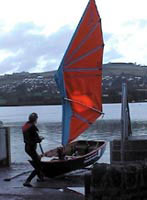Creative talents are well-endowed
Mike Exon on how the National Endowment for Science, Technology and the Arts is nurturing innovation

Since its recent launch in 1998, the National Endowment for Science, Technology and the Arts has helped to fund some 16 design sector initiatives. Altogether, the organisation has provided help for 141 projects, collectively worth £10.5m.
Nesta award recipient Richard Dryden recently completed the design of his flexible sailing rig, inspired by the form of a bird wing. ‘Birds are constantly changing the shape of their wings, contracting and stretching them according to the wind strength. It struck me that this was how a sail should work,’ says Dryden. He was awarded £45 000 to design a working prototype last August.
This week sees Nesta’s latest round of 45 funding awards from which we have selected a handful of projects pertinent to the design sector.
First is the Science Museum, which will benefit from a £15 000 education award from Nesta to sponsor its Product of the Future Awards, in collaboration with the Royal College of Art.
The entries will form part of the Wellcome Wing’s Talking Points exhibition, which aims to engage the imagination through a selection of work appropriately spanning science, technology and the arts.
Two pieces of work from the RCA’s final-year exhibition will be selected for the exhibition, which will be developed with curator Owain Davies. The story of the winning design’s development will be told using interactive displays, such as video diaries, notebooks and Internet links.
Warp Records has been given £150 000 to pilot a digital short film project under the banner of Warp Films. The aim is to give support to budding UK directors at a time when the British film industry is suffering from under-investment and is striving not only to compete with the US market, but for its survival. Warp Films believes that with the home film studio now becoming feasible for the first time, digital films for Web broadcasting will also become financially viable.
Project leader Steve Beckett, managing director of Warp Records, has ‘secured commitment’ to produce new films with celebrated directors and Warp collaborators Chris Cunningham, Mike Figgis and Vincent Gallo. Design work for the launch has not yet been completed.
Initially, two branded digital films will be commissioned by Warp Films, which will be premiered on-line over the group’s website. On the design side, there will be a collaboration with Designers Republic for the graphics and for the website, with digital media group Citra.
Nesta is providing investment to cover the cost of commissioning the two shorts and the costs of the website. Down the line, says a spokesman for Warp Films, it is keen to produce feature films for mainstream cinema, and a dedicated Web channel.
As part of its invention and innovation work, Nesta has awarded £25 000 to engineering design consultant Robert Kinson. Kinson is developing an automatic gearbox for vehicles, which is hoped will provide double the acceleration of an existing manual gearbox. Not only will it provide more efficient acceleration, but it is hoped to be cheaper and smaller than a conventional automatic transmission. It will also reduce pollution by up to 50 per cent and improve fuel economy by 20 per cent.
The principle behind the transmission system is called CVT. It is based on an infinite number of gears and no clutch, which enables an optimum level of efficiency to be selected automatically. This produces benefits in smoothness and overall economy.
This concept is not a new one, having been pioneered in the 1970s. But in practice it never really managed to get off the ground.
Kinson claims to have improved upon existing designs, and is currently building a test unit for his own design. This will be subjected to a 20 000 mile test and be checked for retro-fitting on the production line. It will then be tested in the field inside a Range Rover.
Funding of £75 000 has been awarded to a collaboration between Nesta and Lego’s educational division Lego Dacta. The pilot project will run in conjunction with the existing Design and Technology curriculum in ten schools in the UK. It aims to assist creative learning through the use of Lego products in the classroom. The pilot aims to improve the ‘systems and controls’ section of the present curriculum, in which pupils are encouraged to apply their design skills to create technical models.
According to a spokeswoman for Nesta, ‘The project is an opportunity for Nesta to evaluate new resource materials developed by Lego Dacta, which are designed to support part of the curriculum. It could also encourage more young people to consider careers such as designers, engineers and technologists.’
Products will be tested with existing learning materials including teacher’s guidelines and children’s worksheets. The funding for the project will be spread over the next 12 months.
-
Post a comment



